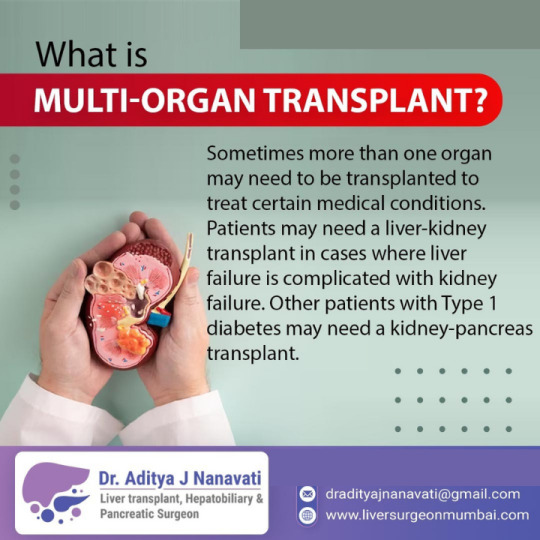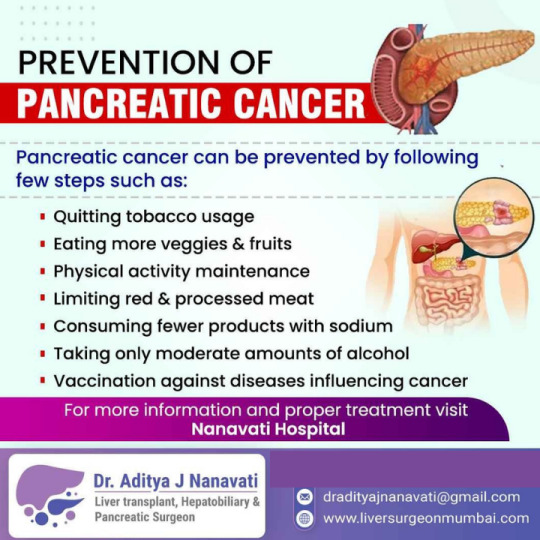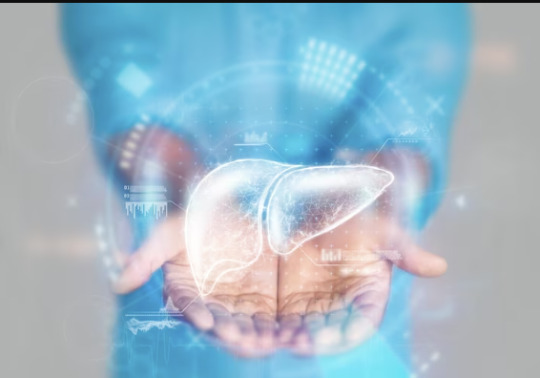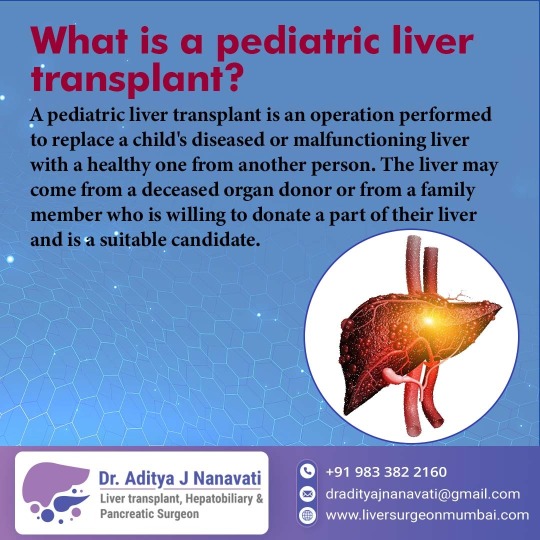Text

Explore the intricate process and life-saving marvel of multi-organ transplantation. This medical procedure involves the transplantation of multiple organs, often crucial for patients facing complex health challenges. Witness the incredible teamwork, advanced surgical techniques, and the hope that multi-organ transplants bring to individuals in need. From heart and liver to kidney and more, delve into the science and stories behind these extraordinary medical interventions.
#MultiOrganTransplant#OrganTransplantation#MedicalMiracle#SurgicalInnovation#HealthcareAdvancements#LifeSavingProcedure#OrganDonation#TransplantJourney#MedicalMarvel#HopeForLife#SurgerySuccess#TeamworkInMedicine#PatientStories#MedicalScience#OrganTransplantAwareness#SurgicalExcellence#DonateLife#MedicalBreakthrough#HealthcareHeroes#ScienceAndMedicine
0 notes
Text

Empower the fight against Pancreatic Cancer through awareness and prevention! 🌟 Join us on a journey to inspire health, share knowledge, and create a future free from this silent foe. Together, we can make a difference! 💙🔒
0 notes
Text
Lifestyle Habits and Liver Health: The Crucial Link You Should Know

Introduction
The liver, one of the body's largest and most vital organs, is responsible for a range of critical functions, including detoxification, metabolism, and bile production. Given its essential role, maintaining optimal liver health is crucial for overall well-being. Several lifestyle habits significantly impact liver health, both positively and negatively. In this blog, we will discuss three key lifestyle factors—alcohol consumption, smoking, and maintaining a healthy weight—and their influence on the liver.
Alcohol Consumption and Liver Health
Excessive alcohol consumption is one of the leading causes of liver damage. When we consume alcohol, the liver's primary task is to metabolize and break it down. However, excessive alcohol overwhelms the liver, leading to the accumulation of fat and inflammation within the liver cells, eventually causing alcoholic liver diseases.
Alcoholic Fatty Liver Disease (AFLD): Initially, alcohol consumption can lead to the development of fatty liver, a condition where fat accumulates within the liver cells. In most cases, this condition is reversible if alcohol consumption is reduced or stopped.
Alcoholic Hepatitis: Prolonged and heavy alcohol intake can progress to alcoholic hepatitis—an inflammatory condition that can cause liver cell damage and impair liver function. Symptoms include jaundice, abdominal pain, and fatigue.
Alcoholic Cirrhosis: The most severe consequence of chronic alcohol abuse is alcoholic cirrhosis, characterized by the irreversible scarring of the liver tissue. This condition can lead to liver failure and the need for a liver transplant.
Smoking and Liver Health
Smoking tobacco is known to have a detrimental effect on various organs in the body, including the liver. Research has shown that smoking increases oxidative stress and inflammation, both of which can contribute to liver damage. Smoking can also exacerbate existing liver conditions and reduce the efficacy of treatments for liver diseases.
Additionally, smoking has been associated with an increased risk of liver cancer, particularly in individuals with underlying liver disease. Therefore, quitting smoking not only improves overall health but also plays a role in supporting liver health.
Maintaining a Healthy Weight and Liver Health
Obesity and being overweight can have significant implications for liver health. Non-alcoholic fatty liver disease (NAFLD) is a condition characterized by the accumulation of fat in the liver in individuals who do not consume excessive alcohol. It is closely linked to obesity, insulin resistance, and metabolic syndrome.
If left untreated, NAFLD can progress to non-alcoholic steatohepatitis (NASH), a more severe form of the disease, which involves liver inflammation and can lead to cirrhosis and liver failure.
A healthy lifestyle that includes regular exercise and a balanced diet can help prevent and manage NAFLD. Incorporating more fruits, vegetables, whole grains, and lean proteins while reducing the intake of sugary and fatty foods can significantly benefit liver health.
Conclusion
The liver's health is paramount to overall well-being, and certain lifestyle habits can significantly impact its function and longevity. Avoiding excessive alcohol consumption, quitting smoking, and maintaining a healthy weight through a balanced diet and regular exercise are essential steps to safeguarding liver health. If you have concerns about your liver health or suspect you may have a liver condition, it's crucial to consult Liver Specialist in Mumbai- Dr Aditya Nanavati.
#LiverDisease#Jaundice#Liver#healthyliver#livertreatment#dradityananavati#livercancerawareness#livertreatmentinpune#livertreatments#livertreatmenthospitalindia#livertransplant#endstageliverdisease#transplantsurgery#healthcare#LiverSpecialist#liverdoctor#livetransplantsurgeoninmumbai#bestlivertransplantsurgeoninmumbai#liversurgeoninmumbai#livertransplantinmumbai
0 notes
Text

Benefits of robotic liver transplant surgery
#LiverDisease#Liver#healthyliver#livertreatment#dradityananavati#livercancerawareness#livertreatmentinpune#livertreatments#livertreatmenthospitalindia#livertransplant#endstageliverdisease#transplantsurgery#healthcare
0 notes
Text

Benefits of Robotic Liver Transplant Surgery
The benefits of robotic liver transplant surgery include:
Minimally invasive
Improved precision:
Reduced blood loss
Faster recovery
#LiverDisease#Liver#healthyliver#livertreatment#dradityananavati#livercancerawareness#livertreatmentinpune#livertreatments#livertreatmenthospitalindia#livertransplant#endstageliverdisease#transplantsurgery#healthcare
0 notes
Text
https://liversurgeonmumbai.com/
Best Liver Transplant Surgeon in Mumbai | Liver specialist in Mumbai - Dr. Aditya J. Nanavati
Dr. Aditya J. Nanavati is one of the Best Liver Transplant Surgeon in Mumbai who practices as Consultant Surgeon, Multi-Organ Transplant and Hepatobiliary Surgeon at Jupiter Hospital, Thane & Indore.
#liversurgeoninmumbai#bestlivertransplantsurgeoninmumbai#dradityananavati#livercancersurgeoninmumbai#liverdoctor#kidneytransplant#liverspecialist#livertransplantinmumbai#livetransplantsurgeoninmumbai#liverspecialistinmumbai
0 notes
Text

Best Liver Transplant Surgeon in Mumbai
A liver transplant is recommended for children who have serious liver problems and will die without a new liver. The most common liver disease in children who need transplants is biliary atresia. This is a rare disease of the liver and bile ducts that occurs in newborns.
#LiverDisease#Liver#healthyliver#livertreatment#dradityananavati#livercancerawareness#livertreatmentinpune#livertreatments#livertreatmenthospitalindia#livertransplant#endstageliverdisease#transplantsurgery#healthcare
0 notes
Text

Sometimes more than one organ may need to be transplanted to treat certain medical conditions. Patients may need a liver-kidney transplant in cases where liver failure is complicated with kidney failure. Other patients with Type 1 diabetes may need a kidney-pancreas transplant.
Visit our Website: https://liversurgeonmumbai.com/
#multi-organ#multi-organtransplant#dradityananavati#liverspecialist#liverdoctor#kidneytransplant#livertransplant#liverhealth#mumbai#livercancer#livertreatment
0 notes
Text
3 Frequently Asked Questions about Alcohol Consumption
Alcohol is one of the most addictive drugs in the world. It is also estimated that nearly 3 million alcohol-related deaths occur worldwide each year.
There has been an increase in the amount of alcohol consumed by women around the world over time, making it a global concern. People are encouraged to think about drinking during Alcohol Awareness Week. It provides us with an opportunity to raise awareness and advocate for change. As part of Alcohol Awareness Week, we will discuss how alcohol affects the body, particularly women.
Q1) what happens when we consume alcohol?
What happens in the body: Alcohol is quickly transported throughout the body in the bloodstreams to all parts of the body after consumption. Until the liver breaks it down, alcohol remains in the bloodstream.
What happens in the Liver: By metabolising alcohol, the liver filters the blood and converts roughly 80 to 90 percent of it into acetaldehyde, which is extremely acidic and causes liver damage in our bodies (breaking it down with the help of enzymes like alcohol dehydrogenase). It also affects multiple organs such as the brain, heart, kidneys, and a variety of other organs.
Q2) what are the health hazards of drinking alcohol ?
Cancer: Women who drink alcohol are more likely to develop breast cancer and head and neck cancer.
Alcohol causes brain cell death, and women are more susceptible to this effect than men.
Pregnancy: If you are trying to conceive, please be aware that alcohol can impair a woman's ability to conceive. And, if you didn't realise you were pregnant and drank alcohol, the chances of harm are low, but you can consult with your doctor if you want. But keep in mind that drinking alcohol at any stage of pregnancy can be extremely dangerous for the baby and can have serious negative consequences for the unborn child. During pregnancy, no amount of alcohol is safe.
Victimization: Alcoholic women are more likely to be victims of sexual assault or other forms of abuse.
Depression and personal injury: In addition, alcohol consumption can contribute to depression, sleeping problems, heart failure, falls, and poor nutrition in women, particularly older women.
Q3) what is the impact of alcohol consumption?
General Outcomes:
It disrupts normal sleep.
Dehydrates both your body and your skin. It also depletes the skin of necessary vitamins and nutrients.
Put on weight. Did you know that two large glasses of wine have the same calorie count as a burger?
It reduces the amount of fat your body burns for fuel. Because we cannot store alcohol in our bodies, our bodies try to eliminate it as soon as possible. This process is more important than nutrient absorption and fat burning.
Other age-related side effects include:
Some menopausal symptoms may be exacerbated by alcohol. Menopause symptoms include hot flushes, night sweats, and weight gain. Alcohol frequently exacerbates these issues. Our bones gradually thin after menopause and as we age, and drinking alcohol can exacerbate this, increasing your risk of osteoporosis. (A condition that affects the bones, making them weak and brittle).
Severe Side Effects:
Depression
Dementia
Mental Health Issues
Alcoholic Hepatitis
Anaemia
Arrhythmias
Cirrhosis
Liver Disease.
Gout
High blood pressure
Nerve injury
Seizures
Stroke
Cardiomyopathy is a chronic heart muscle disease. Certain types of cancer
#liversurgeon#livertransplantsurgeon#liverspecialist#liverdoctor#mumbai#dradityananavati#pancreassurgeon#kidneytransplant#livertransplantspecialist
0 notes
Text

Many people, think fatty liver is just something you have to live with.
“But it's not. If ignored, it can lead to serious complications including cancer or liver transplant.”
#LiverSurgeoninMumbai#LiveTransplantSurgeoninMumbai#BestLiverTransplantSurgeoninMumbai#PancreasSurgeoninMumbai#LiverspecialistinMumbai#livetransplantsurgeoninmumbai#liversurgeoninmumbai#livertransplantinmumbai#PediatricLiverTransplantSurgeoninMumbai#LiverTransplantSpecialistinMumbai
0 notes
Text
What Should You Know About Fatty Liver Disease?
Hepatic steatosis is another word for fatty liver. It occurs when fat accumulates in the liver. Small levels of fat in your liver are natural, but too much can be harmful to your health. The liver is your body's second largest organ. It aids in the digestion of nutrients and the removal of toxic toxins from your blood. Too much fat in your liver can induce inflammation, which can damage and scar your liver. Scarring can cause liver failure in severe circumstances. Alcoholic fatty liver disease occurs when fatty liver develops in someone who consumes a lot of alcohol (AFLD). Nonalcoholic fatty liver disease occurs in people who do not consume a lot of alcohol (NAFLD).
What are the signs and symptoms of fatty liver?
Fatty liver can develop in four stages:
Simple Fatty Liver: Excess fat has accumulated in the liver. If it does not progress, simple fatty liver is typically safe.
Steatohepatitis: In addition to extra fat, there is liver inflammation.
Fibrosis: Chronic liver inflammation has resulted in scarring. However, the liver can continue to operate correctly.
Cirrhosis: Scarring of the liver has grown common, reducing its ability to function. This is the most severe and irreversible stage.
Both AFLD and NAFLD present in the same way. However, fatty liver does not always create visible symptoms. However, you may feel weary or have discomfort or pain in your upper right side of your abdomen. Some persons with fatty liver disease experience problems, such as scarring of the liver. Liver fibrosis is the scarring of the liver. Cirrhosis is a potentially fatal disorder that can induce liver failure if you acquire significant liver fibrosis. Cirrhosis causes lifelong liver damage. That is why it is critical to keep it from growing in the first place.
Cirrhosis can induce the following symptoms:
stomach ache
appetite loss
Weakness or fatigue
nausea
yellow skin and eyes, itching skin
It is critical to follow your doctor's recommended treatment plan to help prevent fatty liver from developing and causing issues.
Fatty liver disease causes:
Excess fat is deposited in liver cells and accumulates in fatty liver disease. A lot of reasons might trigger this fat development. Too much alcohol consumption can result in AFLD. Heavy alcohol consumption can disrupt several metabolic pathways in the liver. Some of these metabolic products can mix with fatty acids to produce fat types that can accumulate in the liver. The cause of fatty liver disease is less obvious in those who do not consume a lot of alcohol. It is likely that these people's bodies produce too much fat or do not digest fat efficiently enough.
One or more of the following factors may play a role in the development of fatty liver disease in people who do not drink much alcohol:
Other possible causes of fatty liver are:
obesity
type 2 diabetes
insulin resistance
high levels of fat, especially triglycerides, in the blood
metabolic syndrome
Other possible causes of fatty liver are:
pregnancy
side effects from some types of medications
some types of infections, such as hepatitis C
certain rare genetic conditions
To diagnose fatty liver, your Liver Specialist will take your medical history, conduct a physical exam, and order one or more tests.
#LiverSurgeoninMumbai#LiveTransplantSurgeoninMumbai#BestLiverTransplantSurgeoninMumbai#PancreasSurgeoninMumbai#LiverCancerSurgeoninMumbai
0 notes
Text
COMMON SYMPTOMS OF LIVER DISEASE
What is liver disease?
The liver is the second-largest organ in your body (after the skin). It is about the size of a football and sits just under your ribcage on the right side. As nutrients and toxins pass through your digestive system, the liver separates them. It also produces bile, a chemical that transports toxins from the body and assists digestion. Liver disease can be passed down through families (genetic). A range of things that affect the liver, such as infections, alcohol consumption, and obesity, can potentially cause liver disorders. Conditions that harm the liver over time can cause scarring (cirrhosis), which can progress to liver failure, a potentially fatal condition. However, early treatment with Liver Surgeon in Mumbai may allow the liver to heal.
Symptoms of Liver Disease:-
Some types of liver illness, such as non-alcohol fatty liver disease, show few symptoms. The most prevalent symptom of other illnesses is jaundice, which is a yellowing of your skin and the whites of your eyes. Jaundice occurs when your liver is unable to eliminate a chemical known as bilirubin.
Other symptoms of liver disease include:
Pain in the abdomen (belly) (especially on the right side).
Bruising easily
Color changes in your urine or faeces.
Fatigue.
Vomiting or nausea.
Swelling of the arms or legs (edema).
Complications of liver disease:-
Some types of liver disease can raise your chances of getting liver cancer. Others, if untreated, will continue to harm your liver. Cirrhosis (scarring) forms. A diseased liver will eventually lack enough healthy tissue to function. Untreated liver disease can eventually lead to liver failure.
Treatment for liver disease:-
Medications: Some types of liver disease are treated with medication by healthcare experts. You may be prescribed medication to treat viral diseases such as hepatitis or hereditary conditions such as Wilson disease.
Changes in lifestyle- Can help you manage certain types of liver disease. Avoiding alcohol, restricting fat and calories, and boosting fibre consumption can all assist if you have fatty liver disease. Abstinence from alcohol can help to improve alcohol-related liver damage.
Liver Transplant- When liver disease advances to liver failure, a liver transplant may be the best option for treatment. A Liver Transplant Surgeon in Mumbai replaces your diseased liver with a healthy liver.
When to see a Liver Specialist in Mumbai ?
If you have any of the following symptoms, you should contact your doctor:
Color changes in your urine or faeces.
Yellowing of the eyes, often known as jaundice.
You are experiencing pain in the upper right side of your abdomen.
Swelling of the arms or legs.
Infection, an inherited illness, cancer, or an overdose of harmful substances can all cause liver disease. Many types of liver disease can be effectively treated by Liver specialist through medication or lifestyle changes. If you have serious liver disease, a liver transplant may help you recover and live longer.
#LiverSurgeoninMumbai#LiveTransplantSurgeoninMumbai#BestLiverTransplantSurgeoninMumbai#LiverCancerSurgeoninMumbai#LiverTransplantinMumbai#GastrointestinalSurgeoninMumbai#LiverspecialistinMumbai
0 notes
Text
Foods to consume for a healthy liver
The liver is the biggest organ in the human body and performs vital daily tasks. To protect the human body, it is responsible for manufacturing vital enzymes, eliminating toxins from the blood, breaking down waste, controlling protein creation, storing iron, and managing the immune system. Many of us may not give our liver's health much thought, but the liver is one of the most important organs in our bodies, working around the clock to keep us healthy and running. Eating the correct meals helps to maintain your liver healthy and helps it perform its duties more efficiently. Consequently, it is crucial to consume a balanced diet full of nutrients that promote liver health.
Below are certain foods to include in your diet for a healthy liver-
1)Tea/Coffee-
One of the drinks you may consume to support liver health is coffee. According to studies, coffee use lowers the chance of developing liver cirrhosis or chronic liver damage. It is significant to highlight that caffeine reduces the amount of aberrant liver enzymes in those at risk for liver disorders and raises antioxidant levels in the liver. Tea is generally good for your health, but studies suggest that tea has particular advantages for your liver. The internal symptoms of liver disease are diminished when green tea is consumed frequently. Tea may enhance the production of liver enzymes and function as an antioxidant.
2)Fruits and vegetables-
Fruits, vegetables, and pulses are essential for the body's growth. These foods include a lot of antioxidants, which assist the liver stay healthy and aid in its ability to recover from injury. Numerous vegetables stimulate the liver's natural detoxifying enzymes, shield it from harm, and raise the level of these enzymes in the blood. Spinach, beetroot, broccoli, cabbage, citrus fruits, apples, grapes, berries, etc. are some examples of fruits and vegetables that are good for the liver.
3)Nuts-
Nuts are advantageous for treating a variety of illnesses since they are rich in minerals, vitamins, lipids, and antioxidants. As a result, eating nuts in your diet helps the liver's general health. Unsaturated fatty acids and antioxidants found in nuts aid in the liver's defence against non-alcoholic fatty liver disease. Nut intake is linked to decreased oxidative stress, insulin resistance, and inflammation as well as a lower incidence of NAFLD.
4)Whole Grains-
The liver benefits greatly from whole grain foods like oatmeal, brown rice, millet, and barley. They have a lot of fiber and prevent the liver from storing as much sugar. Consuming foods high in fiber decreases liver fat and eases indigestion, both of which support liver function.
5)Fish-
Omega-3 fatty acids, which help lessen liver inflammation, are abundant in fatty fish like tuna, salmon, and sardines. These fats keep enzyme levels in check and stop additional fat from building up in the liver. According to studies, the best strategy to enhance liver function, reduce illness risk, and encourage healthy weight reduction is to eat a balanced, nutritious diet that is high in fiber, protein, and healthy fats. If you have NAFLD or are concerned that you might be at danger, consult a Liver Surgeon or Liver Specialist to develop a treatment strategy that incorporates food adjustments as well as lifestyle alterations like boosting physical activity, enhancing sleep, and lowering stress
#liversurgeoninmumbai#livertransplantsurgeonimmumbai#bestlivertransplantsurgeonimmumbai#livertransplantinmumbai#kidneytransplantinmumbai#gastroinstenialsurgeoninmumbai
1 note
·
View note